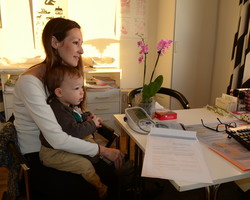Vaccination against measles increases amid ongoing measles outbreaks in Europe

WHO
The WHO European Region achieved 91% routine immunization coverage for the second dose of measles vaccination in 2018. This marks the second consecutive year in which the level of coverage has reached a record high in the Region, according to the WHO–United Nations Children’s Fund (UNICEF) estimates of national immunization coverage released today. It is a welcome sign that an increasing number of parents are choosing vaccination as the safest way to protect their children from serious vaccine-preventable diseases.
One of the drivers of increased vaccination may have been the resurgence of measles in the Region and globally over the past 2 years. From 1 January 2018 to 30 May 2019, 49 of the 53 countries in the Region together reported over 160 000 measles cases and over 100 measles-related deaths. The dramatic increase compared to previous years has been a wake-up call that the disease is serious, highly infectious and a persistent health risk for any susceptible child or adult, no matter where they live.
Enhanced support to stop measles in the European Region
Following a risk assessment of the situation and in line with the WHO Emergency Response Framework (ERF), on 6 May 2019 WHO activated a Grade 2 emergency response to measles circulation in the Region.
WHO’s grading process for emergencies is an internal procedure laid out in the ERF that informs the Organization of the extent, complexity and potential duration of the required response. It raises the profile of the emergency within WHO as well as in Member States, and allows WHO to mobilize the needed technical, financial and human resources in support of the affected countries.
The first situation report for measles in the Region, posted today, provides an overview of the regional status of outbreaks and response measures.
Long-term commitment
The resurgence of measles in the Region occurred because of a build-up over time of susceptible individuals in communities and countries with suboptimal immunization coverage. The consequences of these gaps in coverage have placed a heavy and at times tragic burden on individuals, families, communities and health systems.
As measles is exceptionally contagious, the Region will continue to experience an ongoing cycle of measles outbreaks until the conditions for eliminating the disease – namely immunization coverage above 95% – are met in every community in every country.
WHO/Europe will continue to work with all countries in the Region to respond to measles outbreaks and enhance immunization and disease surveillance systems. This is in line with the strategies to eliminate both measles and rubella outlined in the European Vaccine Action Plan 2015–2020, which was endorsed by all 53 Member States.



